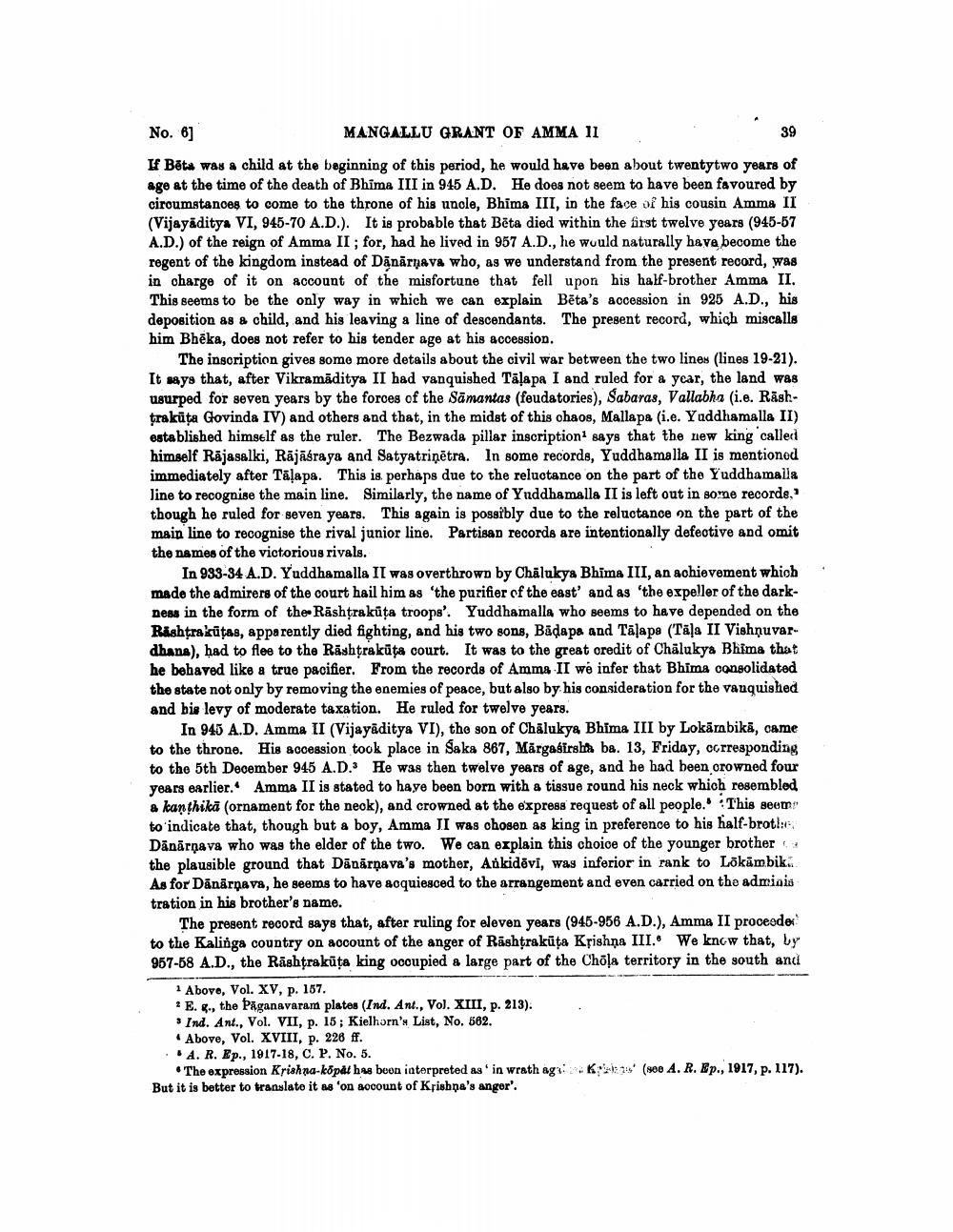________________
39
No. 6]
MANGALLU GRANT OF AMMA 11 If Bēts was a child at the beginning of this period, he would have been about twentytwo years of age at the time of the death of Bhima III in 945 A.D. He does not seem to have been favoured by ciroumatanoes to come to the throne of his uncle, Bhima III, in the face of his cousin Amma II (Vijayaditya VI, 945-70 A.D.). It is probable that Bēta died within the first twelve years (945-57 A.D.) of the reign of Amma II ; for, had he lived in 957 A.D., he would naturally have become the regent of the kingdom instead of Dānärhava who, as we understand from the present record, was in charge of it on account of the misfortune that fell upon his half-brother Amma II. This seems to be the only way in which we can explain Bēta's accession in 925 A.D., his deposition as a child, and his leaving a line of descendants. The present record, which miscalls him Bhēka, does not refer to his tender age at his accession.
The inscription gives some more details about the civil war between the two lines (lines 19-21). It says that, after Vikramaditya II had vanquished Tālapa I and ruled for a year, the land was usurped for seven years by the forces of the Sämantas (feudatories), Sabaras, Vallabha (i.e. Rashtrakūta Govinda IV) and others and that, in the midst of this chaos, Mallapa (i.e. Yuddhamalla II) established himself as the ruler. The Bezwada pillar inscription says that the new king called himself Rajasalki, Rājāsraya and Satyatrinētra. In some records, Yuddhamalla II is mentioned immediately after Tālapa. This is perhaps due to the reluctance on the part of the Yuddhamalla Jine to recognise the main line. Similarly, the name of Yuddhamalla II is left out in some records, though he ruled for seven years. This again is possibly due to the reluctance on the part of the main line to recognise the rival junior line. Partisan records are intentionally defective and omit the names of the victorious rivals.
In 933-34 A.D. Yuddhamalla II was overthrown by Chalukya Bhima III, an achievement which made the admirers of the court hail him as 'the purifier of the east' and as 'the expeller of the darkness in the form of the Rashtrakūta troops'. Yuddhamalla who seems to have depended on the Rashtrakūtas, apparently died fighting, and his two sons, Badapa and TĀlape (Tāļa II Vishnuvardhana), had to flee to the Rashtrakūta court. It was to the great credit of Chalukya Bhima that he behaved like a true pacifier. From the records of Amma II we infer that Bhima consolidated the state not only by removing the enemies of peace, but also by his consideration for the vanquished and bis levy of moderate taxation. He ruled for twelve years.
In 945 A.D. Amma II (Vijayāditya VI), the son of Chālukya Bhima III by Lokārbikā, came to the throne. His accession took place in Saka 867, Märgasirshta ba. 13, Friday, corresponding to the 5th December 945 A.D.' He was then twelve years of age, and he had been crowned four years earlier. Amma II is stated to haye been born with a tissue round his neck which resembled a kanthika (ornament for the neok), and crowned at the express request of all people. This seem to indicate that, though but a boy, Amma JI was chosen as king in preference to his half-brothe Dānārnava who was the elder of the two. We can explain this choice of the younger brother the plausible ground that Danarnava's mother, Ankidēvi, was inferior in rank to Lökambik As for Dānārņavs, he seems to have acquiesced to the arrangement and even carried on the adminis tration in his brother's name.
The present record says that, after ruling for eleven years (945-956 A.D.), Amma II proceeder to the Kalinga country on account of the anger of Rashtrakūta Krishna III. We know that, by 957-58 A.D., the Rashtrakūta king occupied a large part of the Chola territory in the south and
1 Above, Vol. XV, p. 157. ? E. ., the PĀganavaram plates (Ind. Ant., Vol. XIII, p. 213).
Ind. Ant., Vol. VII, p. 15; Kielhorn's List, No. 582.
Above, Vol. XVIII, p. 228 ff. ..A.R. Ep., 1917-18, C. P. No. 5.
• The expression Krishna-kopat has buon iaterpreted as ' in wrath ag . K1422' (see A. R. Ep., 1917, p. 117). But it is better to translate it as 'on account of Krishna's anger'.




